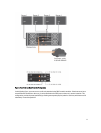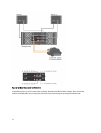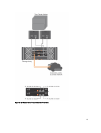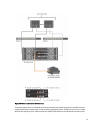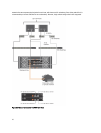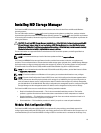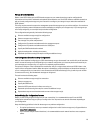
3
Installing MD Storage Manager
The PowerVault MD Series resource media contains software and drivers for both Linux and Microsoft Windows
operating systems.
The root of the media contains a readme.txt file covering changes to the software, updates, fixes, patches, and other
important data applicable to both Linux and Windows operating systems. The readme.txt file also specifies requirements
for accessing documentation, information regarding versions of the software on the media, and system requirements for
running the software.
CAUTION: Do not install MD Storage Manager exclusively on a virtual disk that is being actively managed by MD
Storage Manager. Instead, install at least one instance of MD Storage Manager on a local disk that is running
SMagent and SMmonitor. Installing management software only on a virtual disk may prevent access to recovery
information in the event of multiple physical disk or enclosure failures.
For more information on supported hardware and software for Dell PowerVault systems, see the Support Matrix at
support.dell.com/manuals.
NOTE: It is recommended that you install all the latest updates available at support.dell.com.
The PowerVault MD3660i Series storage firmware installer provides features that include the core software and
providers. The core software feature includes the host-based storage agent, multipath driver, and MD Storage Manager
application used to configure, manage and monitor the storage array solution. The providers feature include providers
for the Microsoft Virtual Disk Service (VDS) and Microsoft Volume Shadow-Copy Service (VSS) framework.
NOTE: For more information about the Microsoft VDS and Microsoft VSS providers, see the Administrator's Guide
at support.dell.com/manuals.
NOTE: To install the software on a Windows or Linux system, you must have administrative or root privileges.
NOTE: If Dynamic Host Configuration Protocol (DHCP) is not used, initial configuration of the management station
must be performed on the same physical subnet as the storage array. Additionally, during initial configuration, at
least one network adapter must be configured on the same IP subnet as the storage array’s default management
port (192.168.128.101 or 192.168.128.102). After initial configuration, the management ports are configured using MD
Storage Manager and the management station’s IP address can be changed back to the previous settings.
The PowerVault MD Series resource media offers the following installation methods:
• Graphical Installation (Recommended) — This is the recommended installation procedure. The installer
presents a graphical wizard-driven interface that allows customization of which components are installed.
• Console Installation — This installation procedure is useful for Linux users who do not desire to install an X-
Window environment on their supported Linux platform.
• Silent Installation — This installation procedure is useful if you prefer to create scripted installations.
Modular Disk Configuration Utility
The PowerVault MD Configuration Utility (MDCU) is an optional utility that provides a consolidated approach for
configuring the management and iSCSI host ports, and creating sessions for the iSCSI modular disk storage arrays. It is
recommended that you use PowerVault MDCU to configure iSCSI on each host server connected to the storage array.
19



